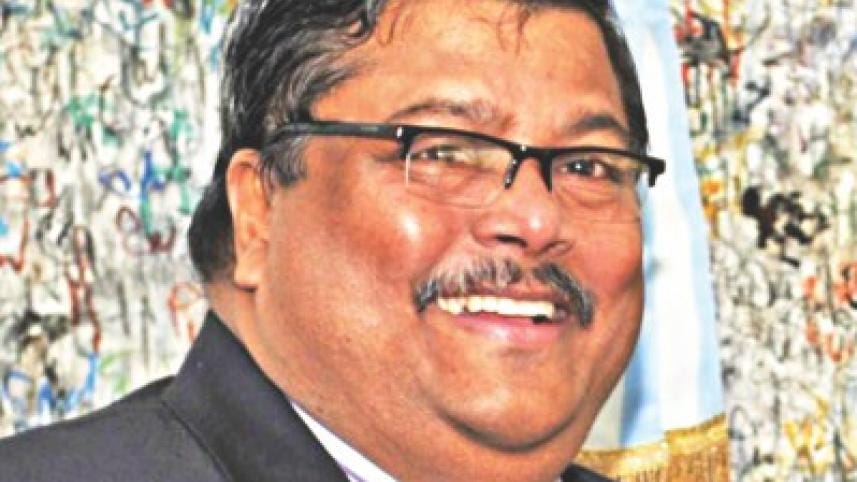A man of many strengths

On February 12, 2017, I first came to learn from a Facebook message from the Bangladesh Embassy inBrasilia that Mohamed Mijarul Quayes, Bangladesh Ambassador to Brazil, and former Foreign Secretary, was in an ICU there with serious respiratory and renal complications. The message alarmed me, sendingchills down my spine. Against the backdrop of the close brush that Quayes – my friend and batch mate – had had with death in 2012, I felt an apprehension that he was again in for a second duel with the Grim Reaper. Agruesomequestion sneaked into my mind: Can Quayes, a physical and intellectual stalwart, return triumphant from his second encounter with death? Unfortunately and devastatingly for all of us – his friends, colleagues and admirers – this time he couldn't. He passed away at about 6 am on Saturday, March 11, 2017.
The premature death of Quayes, at 57, was like a sudden and abrupt disappearance of a bright star from the firmament of the Bangladesh Civil Service. It's a pity that a man so vibrant, bubbly and full of life should die such an untimely death. With rare and sterling virtues and qualities, Quayes was extraordinary and outstanding in many ways. A robust and retentive memory bolstered his intellectual splendour. He was the quintessential scholar diplomat; equipped with the state-of-the-art knowledge in diverse matters which enabled him to face with full confidence his counterparts in bilateral, international and multinational forums and situations. As Foreign Secretary and a senior career diplomat, he made direct contributions to the government's achievements of foreign policy objectives. Being an art, music and literature enthusiast, besides his job in the government, Quayes always kept himself involved with literary and cultural organisations. He was also achieving prominence as an art critic.
With an aptitude for speaking effectively, and with a natural endowment of a rich sense of humour, he could easily become a central figure in any gathering of friends, colleagues, or strangers. He used to often crack jokes that were his own. Regardless of whether it was informal conversations or serious discourses, they always betrayed the depth of his learning. His knowledge of art and literature, songs and music, history, culture, psychology, philosophy, science, etc. was surprisingly profound. His was a multi-faceted talent which I would dare call genius.
Ambassador Quayes had an enormous self-confidence, which I believe had its roots in his knowledge of himself and his intellectual capability. His mind had a sort of unshakeable equanimity and serenity about it that helped him remain unfazed and self-composed under any amount of pressure or anxiety. During my more than 30 years of association with him, I never saw him losing his temper. Under provoking circumstances, he would at most show some irritation. And I cannot recall even a single occasion when he indulged in backbiting or used swear words against anyone. At his level of modesty, elegance and cultural refinement, he was above those frailties.
In the late 1990s, when he was posted in the Bangladesh Mission in Singapore as Counsellor, a part of his job was to look after the Bangladeshi patients (many of whom were critically or terminally ill), who travelled to Singapore for medical treatment. Taking care of the patients and their accompanying family members also embodied providing emotional support to them. All that was truly an unenviable job, but Quayes did it with alacrity and a smiling face. He kept the door of his residence always wide open for any of those patients or their escorting family members who wanted to stay with him and his family. His and his family's generosity never dried up in doing this.
A man of many strengths, Quayes had only one serious weakness, his Achilles' heel - his recklessness about eating food his doctors advised him not to. Apart from being a voracious reader, he was a voracious eater as well. Perhaps his obesity played a role in his untimely death.
Quayes was good of head and heart. He loved socialising and being in the midst of friends and colleagues, especially batch mates and other cadres. He was loved and admired by all of them. They fondly nicknamed him 'Miserable Quayes', punning on his first name 'Mijarul', and he seemed to enjoy the nickname. When shamming anger towards close friends (his equals or near juniors whomhe held in great affection), he used to punch them on their upper arms or backs with his big fists. Those punches invariably amused the 'victims', and made them gravitate emotionally still closer towards Quayes.
Ambassador Mohamed Mijarul Quayes will be greatly missed and always remembered by his innumerable friends, colleagues, and admirers at home and abroad. He will continue to live in their hearts.
The writer is a former Ambassador and Secretary.



 For all latest news, follow The Daily Star's Google News channel.
For all latest news, follow The Daily Star's Google News channel.
Comments